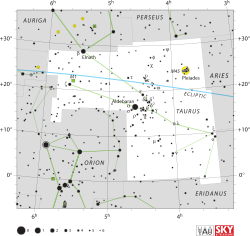Psi Tauri
| Psi Tauri (ψ) | |
 | |
| Observationsdata Epok: J2000.0 | |
|---|---|
| Stjärnbild | Oxen |
| Rektascension | 04t 07m 00,45652s[1] |
| Deklination | 29° 00′ 04,7021″[1] |
| Skenbar magnitud () | +5,22[2] |
| Stjärntyp | |
| Spektraltyp | F1 V[3] |
| U–B | -0,01[2] |
| B–V | +0,34[2] |
| Astrometri | |
| Radialhastighet () | +9,0 ± 0,8[4] km/s |
| Egenrörelse (µ) | RA: -91,40[1] mas/år Dek.: +7,58[1] mas/år |
| Parallax () | 36,23 ± 0,35[1] |
| Avstånd | 90 ± 0,9 lå (27,6 ± 0,3 pc) |
| Absolut magnitud () | 3,01[5] |
| Detaljer | |
| Massa | 1,59[5] M☉ |
| Luminositet | 4,82[6] L☉ |
| Temperatur | 7 088 ± 241[5] K |
| Metallicitet | -0,20[7] dex |
| Vinkelhastighet | 45,4 ± 2,3[8] km/s |
| Ålder | 1,435[5] miljarder år |
| Andra beteckningar | |
| ψ Tau, 42 Tauri, BD + 28° 619, FK5 2295, HD 25867, HIP 19205, HR 1269, SAO 76461[9] | |
Psi Tauri (ψ Tauri, förkortat Psi Tau, ψ Tau) som är stjärnans Bayerbeteckning, är en ensam stjärna[10] belägen i den nordöstra delen av stjärnbilden Oxen. Den har en skenbar magnitud på 5,22[2] och är synlig för blotta ögat. Baserat på parallaxmätning inom Hipparcosuppdraget på ca 36,2 mas,[1] beräknas den befinna sig på ett avstånd av ca 90 ljusår (28 parsek) från solen.
Egenskaper
Psi Tauri A är en blå till vit stjärna i huvudserien av spektralklass F1 V[3]. Den har en massa som är omkring 1,6[5] gånger större än solens massa och utsänder från dess fotosfär ca 5[6] gånger mera energi än solen vid en effektiv temperatur på ca 7 100[5] K.
Källor
- Den här artikeln är helt eller delvis baserad på material från engelskspråkiga Wikipedia, tidigare version.
Referenser
- ^ [a b c d e f] van Leeuwen, F. (2007), "Validation of the new Hipparcos reduction", Astronomy and Astrophysics, 474 (2): 653–664, Bibcode:2007A&A...474..653V, arXiv:0708.1752 , doi:10.1051/0004-6361:20078357.
- ^ [a b c d] Landolt, A. U. (October 1967), "Photoelectric UBV sequences in Taurus", Astronomical Journal, 72: 1012−1018, Bibcode:1967AJ.....72.1012L, doi:10.1086/110377.
- ^ [a b] Cowley, Anne; Fraquelli, Dorothy (February 1974), "MK Spectral Types for Some Bright F Stars", Publications of the Astronomical Society of the Pacific, 86 (509): 70, Bibcode:1974PASP...86...70C, doi:10.1086/129562.
- ^ de Bruijne, J. H. J.; Eilers, A.-C. (October 2012), "Radial velocities for the HIPPARCOS-Gaia Hundred-Thousand-Proper-Motion project", Astronomy & Astrophysics, 546: 14, Bibcode:2012A&A...546A..61D, arXiv:1208.3048 , doi:10.1051/0004-6361/201219219, A61.
- ^ [a b c d e f] David, Trevor J.; Hillenbrand, Lynne A. (2015), "The Ages of Early-Type Stars: Strömgren Photometric Methods Calibrated, Validated, Tested, and Applied to Hosts and Prospective Hosts of Directly Imaged Exoplanets", The Astrophysical Journal, 804 (2): 146, Bibcode:2015ApJ...804..146D, arXiv:1501.03154 , doi:10.1088/0004-637X/804/2/146.
- ^ [a b] McDonald, I.; et al. (2012), "Fundamental Parameters and Infrared Excesses of Hipparcos Stars", Monthly Notices of the Royal Astronomical Society, 427 (1): 343–57, Bibcode:2012MNRAS.427..343M, arXiv:1208.2037 , doi:10.1111/j.1365-2966.2012.21873.x.
- ^ Holmberg, J.; et al. (July 2009), "The Geneva-Copenhagen survey of the solar neighbourhood. III. Improved distances, ages, and kinematics", Astronomy and Astrophysics, 501 (3): 941–947, Bibcode:2009A&A...501..941H, arXiv:0811.3982 , doi:10.1051/0004-6361/200811191.
- ^ Ammler-von Eiff, M.; Reiners, A. (June 2012), "New measurements of rotation and differential rotation in A-F stars: are there two populations of differentially rotating stars?", Astronomy & Astrophysics, 542: 31, Bibcode:2012A&A...542A.116A, arXiv:1204.2459 , doi:10.1051/0004-6361/201118724, A116.
- ^ "psi Tau". SIMBAD. Centre de données astronomiques de Strasbourg. Hämtad 2017-06-30.
- ^ Eggleton, P. P.; Tokovinin, A. A. (September 2008), "A catalogue of multiplicity among bright stellar systems", Monthly Notices of the Royal Astronomical Society, 389 (2): 869–879, Bibcode:2008MNRAS.389..869E, arXiv:0806.2878 , doi:10.1111/j.1365-2966.2008.13596.x.
Externa länkar
Media som används på denna webbplats
Författare/Upphovsman: IAU and Sky & Telescope magazine (Roger Sinnott & Rick Fienberg), Licens: CC BY 3.0
IAU Taurus chart


